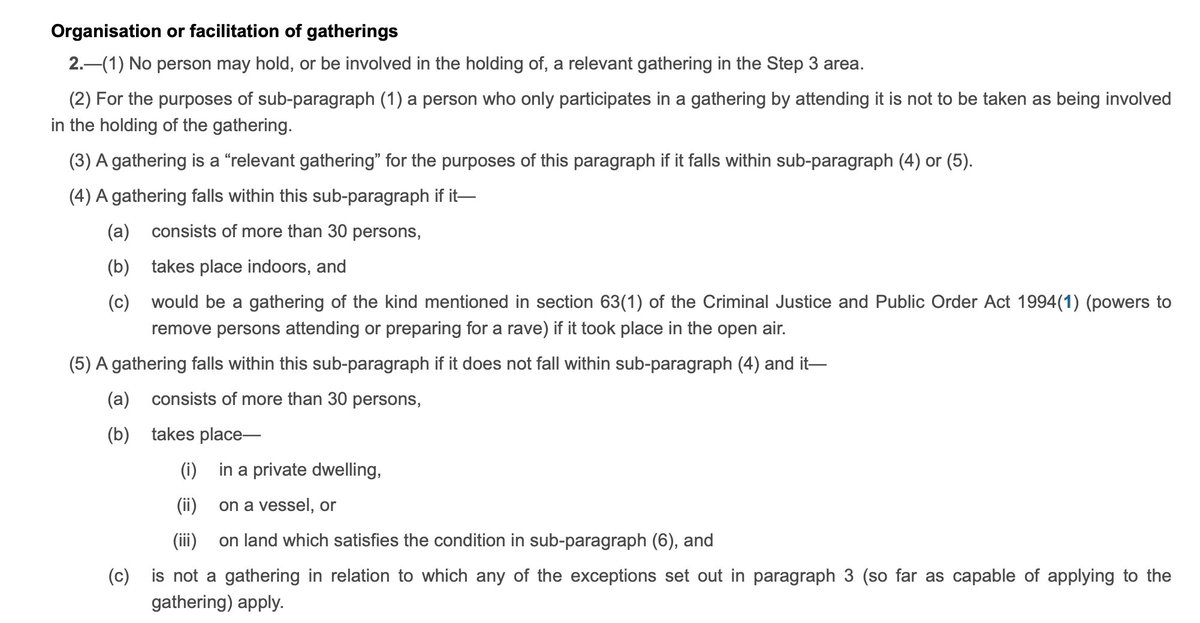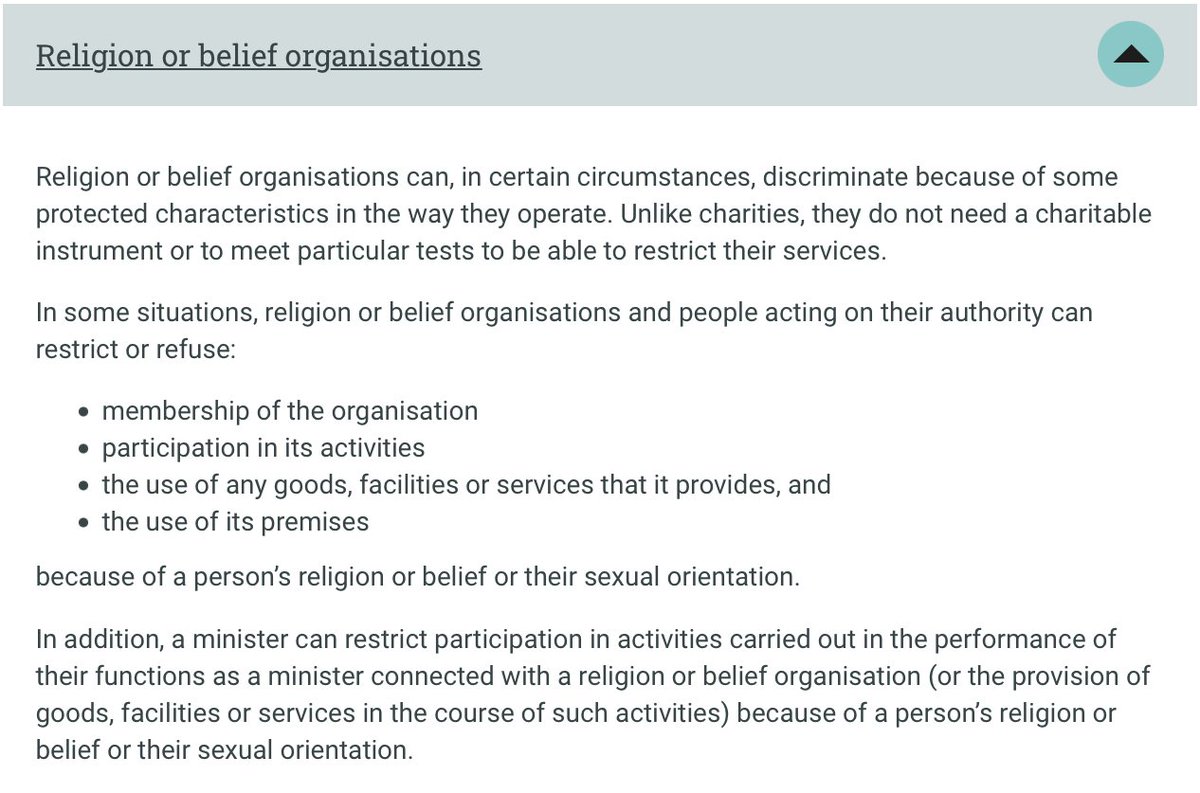
I'm getting a lot of questions about rules for organising weddings 💒
Obviously a big worry for people as could end up with a £10,000 fixed penalty notice if they don't follow rules (including law and even guidance).
What questions do you have about covid rules and weddings?
Obviously a big worry for people as could end up with a £10,000 fixed penalty notice if they don't follow rules (including law and even guidance).
What questions do you have about covid rules and weddings?
OK, so the problem, I think, isn't with people organising weddings - it's that the law is confusing. And I'm afraid I might not be able to make it entirely clear. Because it's not.
The starting point is anyone who "hold[s], or [is] involved in the holding of, a relevant gathering" can get a £10,000 fixed penalty notice
A relevant gathering is a gathering of more than 30 people where no exception applies
legislation.gov.uk/uksi/2021/364/…
A relevant gathering is a gathering of more than 30 people where no exception applies
legislation.gov.uk/uksi/2021/364/…

There are many potential exceptions but the relevant ones to weddings from 11:55pm on 20 June (don't ask) are these: 



The new rules mean (in summary) that the strict numbers limits have been removed and you can have a marriage ceremony and wedding reception indoors with however many people the venue considers to be safe - as long as not in a private dwelling.
But here's the difficulty.
The gathering organiser or manager (which could be the people getting married or the wedding planner... etc) need to follow the "required precautions".
The gathering organiser or manager (which could be the people getting married or the wedding planner... etc) need to follow the "required precautions".

The "required precautions" are defined here:
legislation.gov.uk/uksi/2021/364/…
Key is you have to:
take into account—
(a)the risk assessment carried out under paragraph (2), and
(b)any guidance issued by the government which is relevant to the gathering
legislation.gov.uk/uksi/2021/364/…
Key is you have to:
take into account—
(a)the risk assessment carried out under paragraph (2), and
(b)any guidance issued by the government which is relevant to the gathering

Now here's the rub. If you don't take the "required precautions" your gathering no longer falls within the marriage/wedding reception exception.
Which means if your gathering is more than 30 people, you could get a £10,000 fixed penalty notice.
Ouch! 🎁
Which means if your gathering is more than 30 people, you could get a £10,000 fixed penalty notice.
Ouch! 🎁
And here's the second difficulty - to take the "required precautions" you have to "take into account" "any guidance issued by the government which is relevant to the gathering".
I have often said that the law and guidance are separate, and guidance is what you should follow and law is what you must follow.
But with this aspect of the regulations you actually do need *legally* to take into account the guidance. So it's complicated.
But with this aspect of the regulations you actually do need *legally* to take into account the guidance. So it's complicated.
What guidance is "relevant to the gathering"?
Well, obviously it's this
"How to safely plan a wedding or civil partnership, or funeral, wake or commemoration"
gov.uk/guidance/coron…
Well, obviously it's this
"How to safely plan a wedding or civil partnership, or funeral, wake or commemoration"
gov.uk/guidance/coron…
But also, this!
"Wedding and civil partnership ceremonies, receptions and celebrations"
I don't know why there are two sets of guidance
gov.uk/guidance/coron…
"Wedding and civil partnership ceremonies, receptions and celebrations"
I don't know why there are two sets of guidance
gov.uk/guidance/coron…
OK, so far so good.
But the second lot of guidance cross refers to other non-wedding guidance
Such as this on social distancing gov.uk/guidance/meeti…
And this gov.uk/marriages-civi…
But it get's more complicated
But the second lot of guidance cross refers to other non-wedding guidance
Such as this on social distancing gov.uk/guidance/meeti…
And this gov.uk/marriages-civi…
But it get's more complicated
Because the guidance cross-refers to lots more
including
guidance for hotel and other accommodation providers
guidance on performing arts
guidance on face coverings
guidance on shielding and protecting vulnerable people
guidance for restaurants, pubs, bars and takeaway service
including
guidance for hotel and other accommodation providers
guidance on performing arts
guidance on face coverings
guidance on shielding and protecting vulnerable people
guidance for restaurants, pubs, bars and takeaway service

This is impossible to figure out for the public. You can keep clicking through guidance and it is tens of thousands of words. What is meant to apply? Of course most relevant guidance has wedding written at the top - but it does specifically tell you to look at the other guidance
To take a practical example - I was told earlier today that some venues are saying that people have to sit at maximum tables of 6. This doesn't come from the wedding guidance but the pub guidance, which is cross referred. What are venues meant to do about this?
Most importantly, how are people meant to know how they are not going to be subject to a £10,000 fixed penalty notice from police who are no more able to figure this out than the public?!
Anyway, I'll sleep on it and try and answer some of the specific questions.
I can say now that I'm pretty confident you can't hold a wedding reception 10 years after your wedding @JuliaHB1!
I can say now that I'm pretty confident you can't hold a wedding reception 10 years after your wedding @JuliaHB1!
This is good advice to anyone organising a wedding. Keep a note of what guidance you are taking into account and how. The more detail, the better (annoying, I know)
https://twitter.com/TomRHickman/status/1405436470249373698?s=20
Me on @TimesRadio this morning pointing out some of the issues with voluminous guidance which can contradict itself
https://twitter.com/TimesRadio/status/1405455174060105728?s=20
• • •
Missing some Tweet in this thread? You can try to
force a refresh






